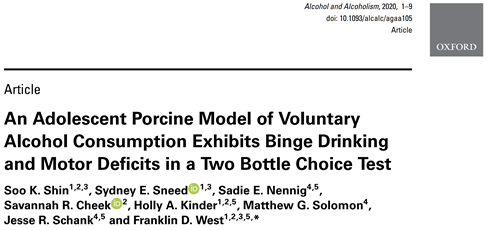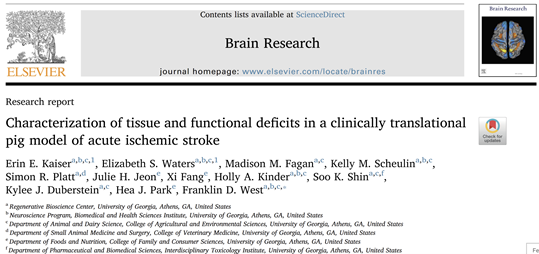Erin Kaiser
-

Alcohol is of the most commonly abused substances, thus leading to significant medical and financial burdens. Pigs are an attractive model for studying alcohol abuse disorder (AUD) due to comparable alcohol consumption behavior and metabolism. This study investigates voluntary binge drinking behavior and provides a detailed analysis of associated motor function deficits in intoxicated pigs.…
Posted in: Publications -

The University of Georgia Alumni Association recently honored Dr. Franklin West as one of this year’s 40 Under 40 which recognizes the personal, professional, and philanthropic achievements of successful University of Georgia graduates under the age of 40. Read more at alumni.uga.edu.
Posted in: News and Events -

The acute stroke phase is a critical time frame used to evaluate stroke severity, therapeutic options, and prognosis while also serving as a major tool for the development of diagnostics. To further understand stroke pathophysiology and to enhance the development of treatments, our group developed a translational pig ischemic stroke model. In this study, the…
Posted in: Publications -

It’s been almost a quarter century since the first drug was approved for stroke. But what’s even more striking is that only a single drug remains approved today. In a publication appearing this month in the journal Translational Stroke Research, the TNRR Laboratory and Aruna Bio, funded by the National Institutes of Health, present brain-imaging data for…
Posted in: News and Events -

Magnetic resonance imaging (MRI) is a clinically relevant non-invasive imaging tool commonly utilized to assess stroke progression in real time. This study investigated the utility of MRI as a predictive measure of clinical and functional outcomes when a stroke intervention is withheld or provided, in order to identify biomarkers for stroke functional outcome under these…
Posted in: Publications -

The high morbidity and mortality rate of ischemic stroke in humans has led to the development of numerous animal models that replicate human stroke to further understand the underlying pathophysiology and to explore potential therapeutic interventions. Although promising therapeutics have been identified using these animal models, with most undergoing significant testing in rodent models, the…
Posted in: Publications -

Dr. Franklin West received the Young Alumni Achiever award at the 65th annual University of Georgia College of Agricultural and Environmental Sciences Alumni Association Awards for his outstanding achievements.
Posted in: News and Events -

See our publication “Traumatic Brain Injury Results in Dynamic Brain Structure Changes Leading to Acute and Chronic Motor Function Deficits in a Pediatric Piglet Model” in the Journal of Neurotrauma.
Posted in: Publications -

Traumatic brain injury (TBI) is a leading cause of death and disability in children. Pediatric TBI patients often suffer from crippling cognitive, emotional, and motor function deficits that have negative lifelong effects. The objective of this study was to longitudinally assess TBI pathophysiology using multi-parametric magnetic resonance imaging (MRI), gait analysis, and histological approaches in…
Posted in: Publications -

The Translational Neural Repair and Regeneration Laboratory announces the publication of a novel study in the Journal of Neurotrauma in which controlled cortical impact led to cognitive and motor function deficits that correspond to cellular pathology in a piglet traumatic brain injury model.
Posted in: Publications